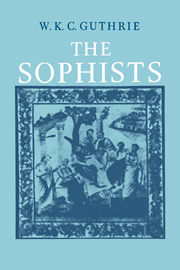Book contents
- Frontmatter
- Contents
- List of Abbreviations
- Preface
- I INTRODUCTION
- II TOPICS OF THE DAY
- III WHAT IS A SOPHIST?
- IV THE ‘NOMOS’ – ‘PHYSIS’ ANTITHESIS IN MORALS AND POLITICS
- V THE SOCIAL COMPACT
- VI EQUALITY
- VII THE RELATIVITY OF VALUES AND ITS EFFECTS ON ETHICAL THEORY
- VIII RHETORIC AND PHILOSOPHY (Seeming and being, believing and knowing, persuading and proving)
- IX RATIONALIST THEORIES OF RELIGION: AGNOSTICISM AND ATHEISM
- X CAN VIRTUE BE TAUGHT?
- XI THE MEN
- Bibliography
- Index of passages quoted or referred to
- General Index
- Index of selected Greek words
IV - THE ‘NOMOS’ – ‘PHYSIS’ ANTITHESIS IN MORALS AND POLITICS
Published online by Cambridge University Press: 05 August 2015
- Frontmatter
- Contents
- List of Abbreviations
- Preface
- I INTRODUCTION
- II TOPICS OF THE DAY
- III WHAT IS A SOPHIST?
- IV THE ‘NOMOS’ – ‘PHYSIS’ ANTITHESIS IN MORALS AND POLITICS
- V THE SOCIAL COMPACT
- VI EQUALITY
- VII THE RELATIVITY OF VALUES AND ITS EFFECTS ON ETHICAL THEORY
- VIII RHETORIC AND PHILOSOPHY (Seeming and being, believing and knowing, persuading and proving)
- IX RATIONALIST THEORIES OF RELIGION: AGNOSTICISM AND ATHEISM
- X CAN VIRTUE BE TAUGHT?
- XI THE MEN
- Bibliography
- Index of passages quoted or referred to
- General Index
- Index of selected Greek words
Summary
The two terms nomos (pi. nomoi) and physis are key-words—in the fifth and fourth centuries one might rather say catch-words—of Greek thought. In earlier writers they do not necessarily appear in-compatible or antithetical, but in the intellectual climate of the fifth century they came to be commonly regarded as opposed and mutually exclusive: what existed ‘by nomos’ was not ‘by physis’ and vice versa. It is with this use of the terms that we shall now be chiefly concerned.
The meaning of physis emerges from a study of the Presocratics. It can safely be translated ‘nature’, though when it occurs in conjunction with nomos the word ‘reality’ will sometimes make the contrast more immediately clear. Nomos for the men of classical times is something that nomizetai, is believed in, practised or held to be right; originally, something that nemetai, is apportioned, distributed or dispensed. That is to say, it presupposes an acting subject—believer, practitioner or apportioner—a mind from which the nomos emanates. Naturally therefore different people had different nomoi but, so long as religion remained an effective force, the devising mind could be the god's, and so there could be nomoi that were applicable to all mankind. ‘Human laws (nomoi) are sustained by the one divine law’ said Heraclitus (fr. 114, vol. 1, 425), and for Hesiod (Erga 276, echoed in the myth of Protagoras, Plato, Prot. 322d) Zeus has laid down ‘a law for all men’, that unlike the beasts they should possess justice. This conception persisted in the Sophistic age. Even the rationalist Thucydides can speak of the self-seeking party politicians of his day as partners in crime rather than observers of the divine law. It appears also in the ‘unwritten laws’ of Sophocles's Antigone, which are divine and everlasting and which no mortal can successfully defy, as Creon learns too late (v. 1113; on ‘unwritten laws’ see pp. 118ff. below).
- Type
- Chapter
- Information
- A History of Greek Philosophy , pp. 55 - 134Publisher: Cambridge University PressPrint publication year: 1977
- 1
- Cited by

